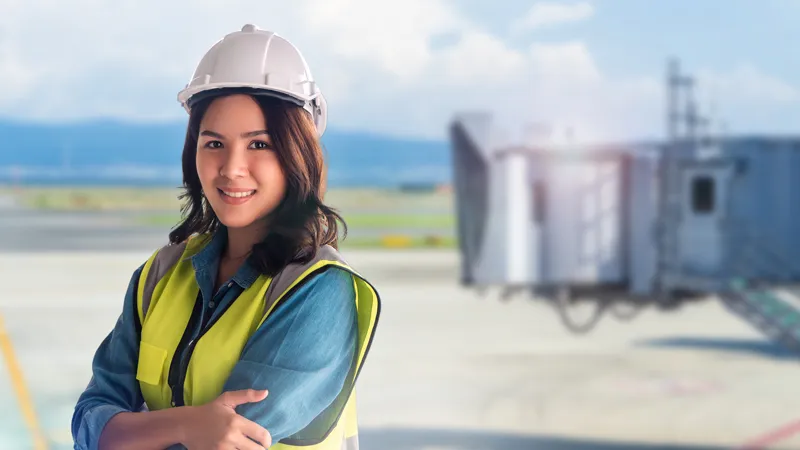All students are required to bring their own notebooks for lessons. You may refer to the required technical specifications for notebook HERE.
This 12-month part-time programme leading to the Diploma in Engineering (Aerospace) will equip you with relevant skill-sets and knowledge to take up important job roles that support airline operations, such as the maintenance and retrofitting of cabin interiors, including the maintenance, repair and overhaul of passenger seats, seat tracks, gallery & equipment, overhead compartments and upholstery, for both commercial aircraft and business jets. The course comprises 2 broad-based aircraft maintenance, aviation management and safety fundamentals Modular Certificates (MC).
Upon completing the 2 broad-based aircraft maintenance, aviation management and safety fundamentals Modular Certificates (MC) under this programme, participants will be able to understand:
- the fundamental knowledge of aircraft materials and their best handling practices using common tools and equipment,
- the correct aircraft maintenance practices and interpretation of blueprint and/or Aircraft Maintenance Manual to perform aircraft maintenance works,
- the applied principles of human factors in aviation industry as well as current in force aviation legislation by the competent authority to ensure safety in aviation operations, OR
- the fundamentals of project management and lean tools for work efficiency and productivity at workplace.
Academic Progression
Participants have the option to undertake the remaining 3 Modular Certificates (MCs) to obtain the part-time Diploma in Engineering (Aerospace). Please see Course Structure for more information.
What You'll Learn
Participants are required to complete a total of 2 skills-based Modular Certificates (MCs). Each MC can be completed in 1 semester, i.e. 6 months. A certificate will be issued once the requirements for each MC are met. Participants must complete the course within 12 months.
Work-Study Certificate Programme (12 months)
Modular Certificate in Aircraft Maintenance
The growing local aircraft industry requires aircraft maintenance personnel who are professionally trained. The Certificate in Aircraft Maintenance provides students with the necessary technical, mechanical and academic knowledge required to complement their working experience in aircraft maintenance, repair, overhaul, modification and other aviation related fields.
Modular Certificate in Aviation Management & Safety
The certificate provides students with a broad understanding of aviation human factors, aviation legislation, project management skills and lean processes. Students will be given opportunities to embark on mini-projects to enhance their understanding of the subject knowledge.
3 more MCs to complete to obtain the Diploma in Engineering (Aerospace) (18 months)
Upon completing the programme, participants have the option to complete the remaining 3 MCs to obtain the part-time Diploma in Engineering (Aerospace):
Modular Certificate in Aircraft Propulsion
After completing this certificate Modular, students will gain fundamental knowledge in thermodynamics, fluid mechanics and the different constructions and working principles of aircraft gas turbine engines.
Modular Certificate in Aircraft Structures
This certificate is designed to equip students with basic knowledge in deriving aircraft structures. The subjects are infused with fundamental concepts of simple statics, methodology in designing members, airframe structures, their construction methods, principles of aerodynamics and flight controls.
Modular Certificate in Avionics Fundamentals
The subjects covered in this certification provide fundamental knowledge in electrical, instruments and computers that control flight and engine that is relevant to aerospace avionic systems.
Modes of Assessment
The subjects in this course are either examination or non-examination based, incorporating both formative and summative assessments. The assessment framework will include a range of coursework assignments, as well as mid-term test and end-of-semester examinations.
For more information on course fee / schedule,
Entry Requirements
Eligibility Criteria
Minimum Entry Requirements for Work-Study Programmes
Work-Study Certificates Leading to Diplomas
ITE Nitec graduates with GPA ≥2.0, OR
Higher Nitec graduates from the list of feeder ITE Nitec / Higher Nitec programmes in relevant discipline or equivalent
Work-Study Programme Incentives Eligibility
Work-Study Programmes sign-on incentives are extended to eligible Singaporeans who are:
- within three years of graduation from the Polytechnics/ITE or the Operational Ready Date (ORD) for full-time National Servicemen
This eligibility is subject to prevailing criteria.
Course Contact
- 67881212
-
Monday - Thursday: 8:30am - 6:00pm
Friday: 8:30am - 5:30pm
Closed during lunchtime, 12:00pm - 1:00pm
and on weekends and public holidays. - Website: https://www.tp.edu.sg/wsp
-
Temasek SkillsFuture Academy (TSA)
Temasek Polytechnic
East Wing, Block 1A, Level 3, Unit 109
21 Tampines Ave 1
Singapore 529757
Temasek Polytechnic reserves the right to alter the course, modify the scale of fee, amend any other information or cancel a course with low enrolment.









